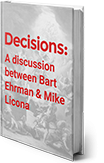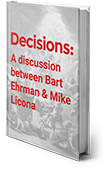The Sweet Words of an Enemy
“A meeting of all the religious leaders was called, and they decided to bribe the soldiers. They told the soldiers, ‘You must say, “Jesus’ disciples came during the night while we were sleeping, and they stole his body.”‘” (Matthew 28:12-13)
If your mother claims that you are an honest person, we may trust you that you will do what you say. Yet some reservation is understandable on our part, since your mother loves you and is looking out for your best interests. Therefore, she is considered a biased source. This does not mean that she is wrong or that her words about you are without merit. However, if someone who hates you tells us that he wants to see you fall, but your honesty is keeping that from happening, then we can be even more comfortable that you are an honest person.
The man was obviously angered reflecting on his recent memory: “He’s nothing but trouble! His dogs begin barking at 4:30 in the morning and we can’t get a decent night’s sleep because of it! He plays his stereo really loud outside. He rarely cuts his grass and his cars leave oil spots all over the road in front of his home.” The jury listened as the attorney asked another question: “Tell me about the evening of November 4.” The man, still angered said, “He had obviously been drinking for a while that day. I was watching the news when around 6:45pm I heard some screams outside. I went to the front door and noticed him chasing the neighbor’s kids with a beer bottle. I ran out to stop him, and that’s when he threatened to hit me with the bottle!”
“Are you sure it was 6:45?” asked the attorney. “Absolutely.” Those were sweet words to the obnoxious neighbor. He was on trial for robbing a convenience store 20 miles away at 6:45 pm that November 4th. There were no fingerprints; only the testimony of the clerk who identified him out of the lineup. But it was a clear case of mistaken identity. His neighbor, whom he had greatly angered, had just testified that at that time he was nowhere near the convenience store, but rather acting out of control outside of his home. The words of his enemy had saved him.
When sharing the Gospel of Christ with others, the words of his enemies can often be useful. Did you know that Jesus’ miracles, his crucifixion, and his empty tomb can all be established from the words of his enemies? Consider the Jewish Talmud, which accuses Jesus of practicing sorcery.(1) Why would you make such an assertion unless that person was performing deeds that appeared miraculous in nature? Also consider the early second century Roman historian, Tacitus, who writes that Christ ” . . . suffered the extreme penalty during the reign of Tiberius at the hands of one of our procutators, Pontius Pilatus . . .”(2) Josephus, The Talmud, Lucian, and Mara Bar-Serapion are all non-Christian sources that likewise attest to Jesus’ execution.(3) What about the empty tomb? Did Jesus’ enemies admit that his tomb was empty? In the year A. D. 150, Justin Martyr records that certain Jews in his day had been chosen and ordained by the leadership to spread the story that the disciples had stolen the body, which is precisely what Matthew had earlier claimed (28:13-15). If you are a critic of Jesus, saw him crucified and now his disciples are claiming he is risen and that his tomb is empty, what are you going to do? You will go to the tomb and see if his body is there. If it is, you will put it on a cart and wheel it down Main Street in Jerusalem and the hoax is over! Instead, all we find the critics saying is that his disciples stole his body. To claim “the dog ate my homework” is an admission that it was not turned in. Likewise, to claim “his disciples stole the body” is an admission that it was not in the tomb. So we have seen that through the mouths of Jesus’ enemies it can be established that he performed deeds that appeared miraculous, he was executed, and his tomb was subsequently empty.
Footnotes…
1. Sanhedrin 43a. This and the following have been documented by Gary R. Habermas in The Historical Jesus (Joplin: College Press, 1996).
2. Tacitus. Annals 15:44.
3. Josephus. Antiquities 18:3; Talmud, Sanhedrin 43a; Lucian. The Death of Peregrine, Chapters 11-13 in The Works of Lucian of Samosata; Mara Bar-Serapion. British Museus, Syriac Manuscript, additional 14,658.





